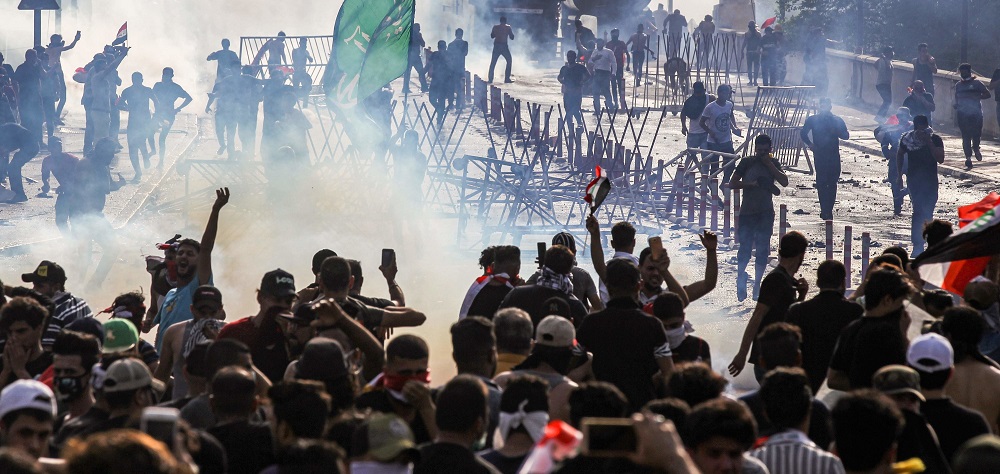Alwaght- After an agreement last month between the government and the protestors to halt the demonstrations for Arabaeen in Iraq, the country since October 25 became anew a theater to rejuvenated protests against corruption, unemployment, deteriorating living conditions, and poor services. The demands for Prime Minister Adel Abdul Mahdi to step down continued this time too. The demands come only a year after Abdul Mahdi assumed the post. So far, the PM has shown resistances, however. The complicated situation in the Arab country gives rise to a question as what is the nature of protests and what goals it is pursuing.
Foreign-orchestrated licentious violence
Since Friday, the day the protests sparked afresh following invitations on social media to meet in the streets of the capital Baghdad and other cities, everything went against the calls by inviters, mainly Muqtada al-Sadr of Saeroon parliamentary alliance, for calm and violence-free demonstrations. The streets turned into violence scenes. Reports say that dozens died and wounded and public places were set aflame. That is beside the destruction of some political and security buildings.
Here a question presents itself: If the protestors were religiously faithful and responsible enough to suspend the protests for the calm arrangement of Arabaeen ceremony as the Shiite clergy asked, then why should the post-Arabaeen demonstrations turn this violent?
The new situation pushed the things to a direction that the PM, as commander-in-chief of the Iraqi armed forces, gave the governors the power to decide if the state of emergency needs to be adopted in the cities under their administration. In Basra, Dhi Qar, Al Muthanna, Wasit, Babil, Karbala, and Diwaniya curfew was imposed.
As the government is well aware of the consequences of violently dealing with the protests and has so far avoided violence as much as possible, many analysts blame the situation on the conspiracies targeting the security and stability of Iraq. Such schemes are designed by those finding a great chance to adopt their plots in the demonstrations against the bad economic conditions and corruption.
It is noteworthy that as much as the protests are violence-hit, the ground is more prepared for the radicalization of the demands, which means smaller chances of political agreement to solve the problems peacefully.
Foreign actors’ opportunistic steps
Adel Abdul Mahdi’s government came out of the parliamentary election in which the US-backed political forces failed to win or even secure an appropriate place in the new parliament. The cabinet was made by largely anti-American forces, mainly Saeroon and Fatah coalitions.
Additionally, as a technocratic figure, Abdul Mahdi over the first year of holding the post proved to go against the American interests. Here are his moves and stances that infuriated the US:
- Opposing the so-called paralyzing sanctions against Iran
- Seeking to de-escalate the tensions between Iran and the Persian Gulf Arab states
- Re-opening Abu Kamal border crossing with Syria
- Seeking a broader business partnership with China
- Voicing opposition to US troops increase in Iraq
These all were in stark contrast to Washington's positions. That is why the White House seriously launched a project to oust him from his post.
Over the past week, the American forces withdrawing from Syria entered Iraq. The government and parliament did not support additional American troops’ entry to Iraq. The US Secretary of Defense visited Baghdad to persuade the Iraqis to allow the stay of the American forces. The US already has 5,200 forces in Iraq providing Iraqi forces with training and consultation as part of the 2009 security pact. The Iraqi parliament was expected to soon debate a bill asking the full US forces withdrawal from the country. Naturally, shaky security conditions will justify the American stay in Iraq.
Al-Akhbar newspaper of Lebanon called the recent protests a plan for a “coup” against Abdul Mahdi. According to the Lebanese newspaper, the coup is arranged by the US, Saudi Arabia, and the UAE. The UAE became the plot architecture center. Tahnoun bin Zayed Al Nahyan, the Emirati national security advisor, and Mohammad Dahlan, his Palestinian aide who is known for his links to the Israeli intelligence services and regime, are the architects of the Iraqi protests. Saudi Arabia has accepted to be the bankroller, providing about $150 million for the project. Iraqi Civil Society Organizations, a body supported financially by the US embassy, is responsible for implementation. The considerable point is that these Iraqi organizations reach 50,000 and only in 2019 the US provided them with $701 million.
This is not hidden from Iraqi officials. Recently many of them warned of such a scenario. On October 23, Nujaba Movement’s spokesman Nasr al-Shamri stated that Al-Hurra network, a television funded by the US Department of State broadcasting from Iraq, has a destructive and conspiratorial role in Iraq and dismissed its “baseless” accusations against Popular Mobilization Forces (PMF), a voluntary force whose foundation dealt a painful blow to the US plans for ISIS terrorist organization stay in Iraq. Al-Hurra recently reported that PMF, or Hashd al-Shabbi in Arabic, opened fire and killed protestors. He strongly denied any firing at the demonstrators.
Other televisions like Al-Sharqia, Al-Baghdadia, Al-Rafdain, and Al-Dijla, all operated by Baathist party’s remains, are used to fuel the violence in Iraq, too.
Iraq’s government and people are expected to show extreme consciousness in the face of the foreign countries which provided arms to terrorist elements to push the peaceful demonstrations towards direct clashes.
What now can help calm the situation is a show of unity by the Iraqi political factions to address the legitimate demands of the people without asking a share in return in the government. In his latest speech, Abdul Mahdi promised cabinet reshuffle without consideration of the political ratio mechanism. This is a significant element of the Iraqi people’s request. Apparent enough, the prerequisite for these plans is legal backing for the government to solve the economic problems using the Shiite clergy recommendations.



























